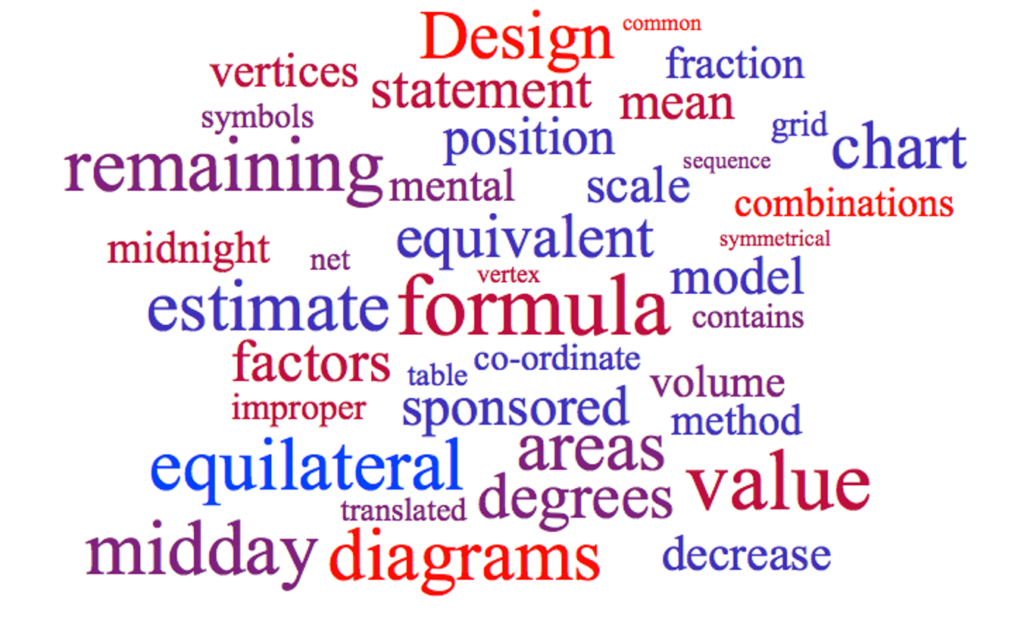Each trainer recognises that each topic is mediated by studying ability, nevertheless it issues in some greater than others, proper? Does it actually matter that a lot in maths?
Once I converse to lecturers, or these faculty leaders answerable for elements of literacy complete faculty, the chorus they usually relate is that studying merely doesn’t matter a lot in maths. Maybe maths lecturers – beleaguered by previous experiences of being led down the trail of generic studying and writing approaches – are merely defending their hard-won instructing floor?
Studying does matter to maths, in fact, however how precisely?
Studying ability and mathematical vocabulary
Everybody recognises the distinctive language of arithmetic that’s separate to the on a regular basis speak of pupils.
Maths is clothed by polysemous vocabulary (phrases which have a number of meanings) that may foster ambiguity and unhelpful misconceptions. Just some embrace:
Prime… issue… base … angle … cardinal … frequent … correct … quantity … distinction and many others.
Not solely that, some maths phrases are homophones (phrases having the identical pronunciation however totally different meanings, origins, or spellings) with extra frequent phrases e.g. pi and pie, sine and signal.
Even easy mathematical operations, like subtraction, is described in numerous methods in typical speak, similar to ‘subtract’, ‘minus’ or ‘take away’. You then add in phrases like ‘lower’, ‘cut back’ and ‘take off’. Academics are consistently translating the language of maths – not in contrast to a German or French trainer.
Researcher, Andrew Rothery, helpfully outlined three classes of mathematical vocabulary:
1. Phrases that are particular to arithmetic and never often encountered in on a regular basis language (e.g. hypotenuse, coefficient).
2. Phrases which happen in arithmetic and unusual English, however contain totally different meanings in these two contexts (e.g. distinction, quantity).
3. Phrases which have the identical or roughly the identical which means in each contexts (e.g. fewer, between).
An additional translation problem is how arithmetic is represented in a number of methods. And so, while you learn or write…
a² + (a +2) ² = 340
The equal sentence in phrases to be learn is…
‘The sum of the squares of two consecutive constructive even integers is 340.’
(Schleppegrell, 2007)
In fact, many maths issues mix these representations, in order that studying is a difficult, multi-faceted act for pupils. Cautious, gradual studying, and re-reading, is usually obligatory to really unpack the mathematical operations required by pupils.
In US analysis, maybe unsurprisingly, it discovered that ‘‘nationally, kids carry out 10% to 30% worse on arithmetic phrase issues than on comparable issues introduced in numeric format.”
Academics of maths will testify to the problem of multi-step phrase issues. We may be assured then that studying in maths *actually* does matter. Precision with mathematical speak will matter. Explicitly instructing on ‘methods to learn like a mathematician’ may show useful for these pupils combating phrase issues.
What different options might help? Specific vocabulary instruction is probably going one helpful technique. Holding a glossary of mathematical phrases, together with accompanying diagrams and representations may assist (this can be notably useful for EAL pupils too).
Being specific and strategic about the way you learn – and re-read – maths issues is probably going to assist many pupils who’re grappling concurrently with studying the arithmetic and the language of arithmetic.
The deft interaction, flipping between on a regular basis language to mathematical phrases, and again once more, by knowledgeable maths lecturers, will in fact show very important when instructing maths and the studying of mathematical issues or textbooks. ‘Maths speak’ will show essential for younger kids, while persevering with to be very important at each key stage.
Studying issues in maths, greater than most lecturers, and pupils, could assume.
Associated assets:
- ACER, from Australia, have produced a wonderful digest on language in arithmetic – HERE.
- Maths mastery have produced a useful vocabulary record – HERE.
- A brand new useful resource from the EEF on addressing misconceptions – ‘REACT to Misconceptions’ – is a helpful method to think about in relation to language being a barrier to mathematical understanding – HERE.

